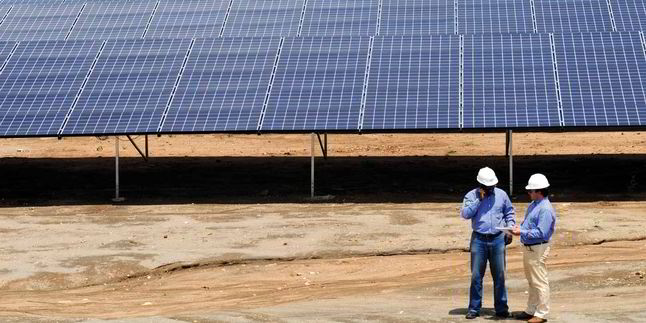The market would need to be at least 2GW a year for such a supply chain to develop, claims Absolar chief executive Rodrigo Sauaia.
Eduardo Azevedo, Brazil’s interim energy planning secretary, told the Intersolar South America conference that the country’s soon-to-be-finished 10-year expansion plan will call for 6.8GW of new solar capacity by 2024.
The plan is nearly completed, and a draft proposal will be published for public consultation in the coming weeks, Azevedo says.
To date, around 3GW of solar capacity has been contracted in three Brazilian federal tenders, all of it due online by 2018, setting an important new market in motion that has caught the eye of many of the world's leading PV suppliers.
Absolar’s Sauaia welcomed the interim government’s confirmation of at least one reserve tender for this December. The government cancelled a tender planned for July and has postponed October’s tender to December 16, for which 13GW of solar projects have been registered.
But Sauaia says 1GW of new solar a year will be insufficient to foster a local cell manufacturing sector, as called for in the National Development Bank’s (BNDES) five-year programme.
“It is possible to produce solar cells in Brazil, but 1GW is not enough … we need an adequate industrial policy,” Sauaia says.
Brazil’s energy policy has seen significant changes since the interim government assumed power in mid-May, after President Dilma Rousseff was suspended from office to face impeachment proceedings in the Senate.
The final Senate vote on Rousseff’s fate is expected at the end of August. If her impeachment is confirmed, the current government would be in power through 2018, when the next presidential elections are scheduled.
Aside from changes to the auction schedule, the interim government is also modifying the planning system and revising tender rules and conditions.
Future tenders will include “more transparency”, Azevedo says, adding that the “interventionism” of the previous government will be abandoned.
As a result of the changes, Absolar has created a working group to discuss financing and is seeking information about BNDES’s local content policy – instituted in 2013 – which aimed to promote a gradual increase in local content, starting with simple components in the first year all the way to the cell production by 2020.
BNDES only finances the purchase of solar equipment from suppliers who are signatories of Brazil’s local-content program.
To date, only China’s BYD and Canadian Solar have announced investments in module-assembly plants in Brazil, with capacities of 200MW and 350MW, respectively. Several suppliers of inverters and tracking systems have been accredited under the program.
Sauaia says that the solar industry will ask that the BNDES appraise the local-content program and discuss its continuation.
“The BNDES has changed its stance [signalling a reduction in financing to boost private financing] and its own internal organisation, so we need to get back closer to the bank and appraise the local-content policies, including the manufacturing of cells, and see how to reactivate the program”, Sauaia says.

